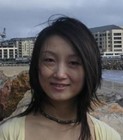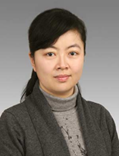OTFS-enabled Satellite Communications (Week 2)
Organizers:
Weijie Yuan, Southern University of Science and Technology
Gunes Karabulut Kurt, Polytechnique Montréal
Lin Bai, Beihang University
Co-organized by Orthogonal Time Frequency Space (OTFS) SIG, Satellite Mega-Constellations SIG, Space Air Ground Integrated (SAGI) Communications SIG in IEEE ComSoc, IEEE YP Montreal, IEEE YP Ottawa, IEEE SB INRS.
-----------------------------------------------------
8:30 am - 8:35 am Welcome Speech by Prof. Gunes Karabulut Kurt
-----------------------------------------------------
8:35 am - 9:35 am First Talk by Prof. Yi Hong
Title: OTFS and delay-Doppler Communications
Abstract: Orthogonal time frequency space (OTFS) modulation has been recently proposed by Hadani et al. at WCNC’17, San Francisco. It was shown to offer significant advantages over OFDM in doubly dispersive channels for high mobility wireless communications. The key idea of OTFS is to model mobile wireless channels in the delay-Doppler domain, where a sparse nature of the geometry of the wireless channel is captured. This talk will introduce the general notion of OTFS/delay-Doppler communications, starting from the fundamentals of high mobility wireless channels, followed by the transceiver architecture used for detection and channel estimation and finally the potential application to LEO Satcom.
-----------------------------------------------------
9:35 am - 10:35 am Second Talk by Prof. Zan Li and Prof. Jia Shi
Topic: OTFS enabled Reliable LEO Satellite Communications: A Killer for Severe Doppler Effect
Abstract: To achieve seamless global coverage, low earth orbit satellite (LEO-Sat) communications are attracting widespread attentions as a complement to terrestrial networks, thanks to the advantages of low cost and flexible deployment. Owing to the inherent high-speed mobile nature of LEO-Sat, it inevitably leads to severe Doppler effects, which greatly affect the reliability of the LEO-Sat links. On the other hand, existing methods for coping with the Doppler effect in LEO-sat scenarios generally suffer from high computational complexity and heavy hardware costs. Under this background, this talk focuses on orthogonal time frequency space (OTFS) modulation to enable reliable LEO-sat communications, which overcomes the Doppler effect by averaging the channel dynamics with modulation information in the delay-Doppler (DD) domain. In particular, this talk will discuss the motivations by presenting the high suitability of OTFS for LEO-sat scenarios, taking into account the Doppler effect characteristics of LEO-Sat communications. Then, this talk will address the feasibility of OTFS applications for LEO-Sat communications, and will present recent related works from our group. Finally, a range of promising research opportunities and potential challenges will be provided.
-----------------------------------------------------
Date and Time
Location
Hosts
Registration
-
 Add Event to Calendar
Add Event to Calendar
Loading virtual attendance info...
Speakers
 Yi Hong
Yi Hong
Biography:
Yi Hong is an Associate Professor in the ECSE DEPT at Monash University. She served as a member of the Australian Research Council College of Experts (2018-20) and she was the Director of Graduate Research (2016-18) of the ECSE Department at Monash University. She is a Senior Member of IEEE, the IET Fellow, and a member of IEEE Communications Society, IEEE Information Theory Soceity, and IEEE Vehicular Technology Society. She was the Tutorial Chair of 2021 IEEE International Symposium on Information Theory, Melbourne. She was the General co-Chair of 2014 IEEE Information Theory Workshop at Hobart, Tasmania; the Technical Program Committee Chair of the 2011 Australian Communication Theory workshop, Melbourne; the Publicity Chair of 2009 IEEE Information Theory Workshop at Taromina, Sicily; and Technical Program Committee Member of various IEEE leading conferences. She is currently the Associate Editor (AE) of IEEE Transactions on Green Communications and Networking (TGCN). She served as the AE for IEEE Wireless Communications Letters (WCL) and Transactions on Emerging Telecommunications Technologies (ETT). She received the NICTA-ACoRN Early Career Researcher award at AUSCTW Adelaide 2007. She leads a group of research students and postdocs working on communications technology, wireless security, and coding techniques for wireless communications and networking as well as SSD storage.
 Zan Li
Zan Li
Biography:
Prof. Zan Li is a University Professor at the Xidian University, China. She received the B.S. degree in communications engineering and the M.S. and Ph.D. degrees in communication and information systems from Xidian University, Xi’an, China, in 1998, 2001, and 2006, respectively. She worked as a visiting scholar at IMEC Technology Center, Belgium, from July 2009 to September 2009. Her research interests include high-security and high-reliable communication, spectrum sensing and utilization, intelligent covert communication, anti-interference communication, etc. She has published 4 books and more than 200 international journal and conference papers in IEEE journals and IEEE Communications Society flagship conferences. She received the Best Paper Awards from EISIC 2015, IEEE ICFNDS 2017, CSPS 2018, and IEEE SAGC 2020, as well as the Distinguished Service Award from the IEEE CIT 2014 and IEEE CITS 2015. Prof. Zan Li is the Fellow of the Institution of Engineering and Technology (IET), China Institute of Electronics (CIE), and China Institute of Communications (CIC), and a Senior Member of IEEE.

Dr. Jia Shi received both his MSc. and Ph.D degrees from University of Southampton, UK, in 2010 and 2015, respectively. He was a research associate with Lancaster University, UK, during 2015-2017. Then, he became a research fellow with 5GIC, University of Surrey, UK, from 2017 to 2018. Since 2018, he joined Xidian University, China, and now is an Associate Professor in National Key Lab. of Integrated Services Networks (ISN). His current research interests include resource allocation in wireless systems, reliable LEO satellite communicartions, covert communications, physical layer security, mmWave communications, satellite communications etc. He is now serving as an Associate Editor for Electronic Letters, and an Editor for International Journal of Communications System, and is serving as a Guest Editor for China Communications.
Agenda
8:30 am - 8:35 am Welcome Speech by Prof. Gunes Karabulut Kurt
8:35 am - 9:35 am First Talk by Prof. Yi Hong
9:35 am - 10:35 am Second Talk by Prof. Zan Li and Prof. Jia Shi
This event is co-sponsored by STARaCOM


